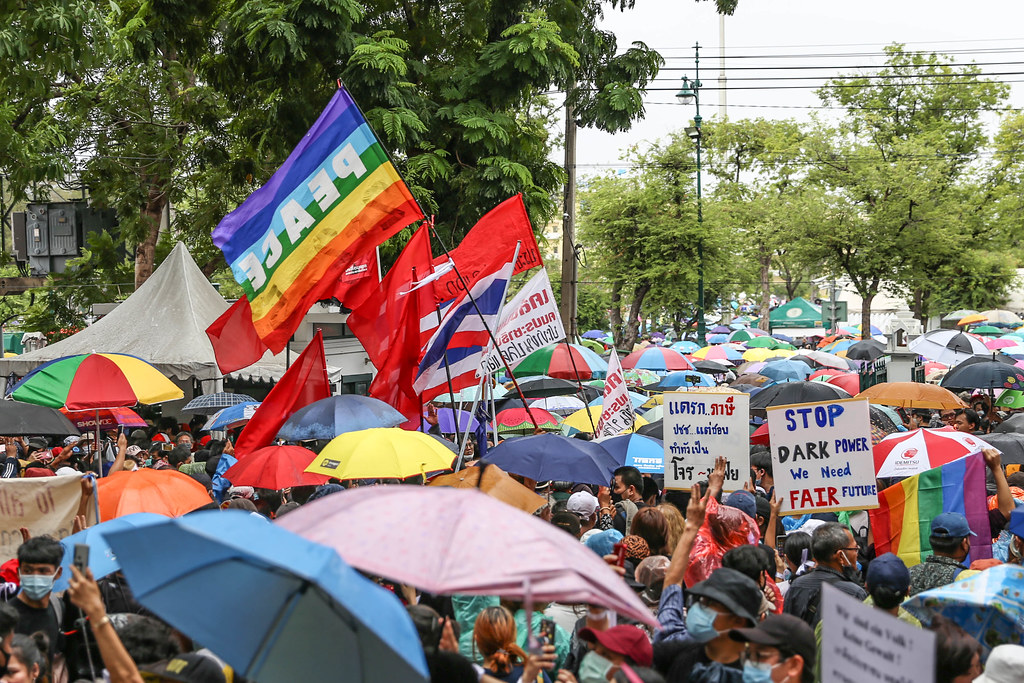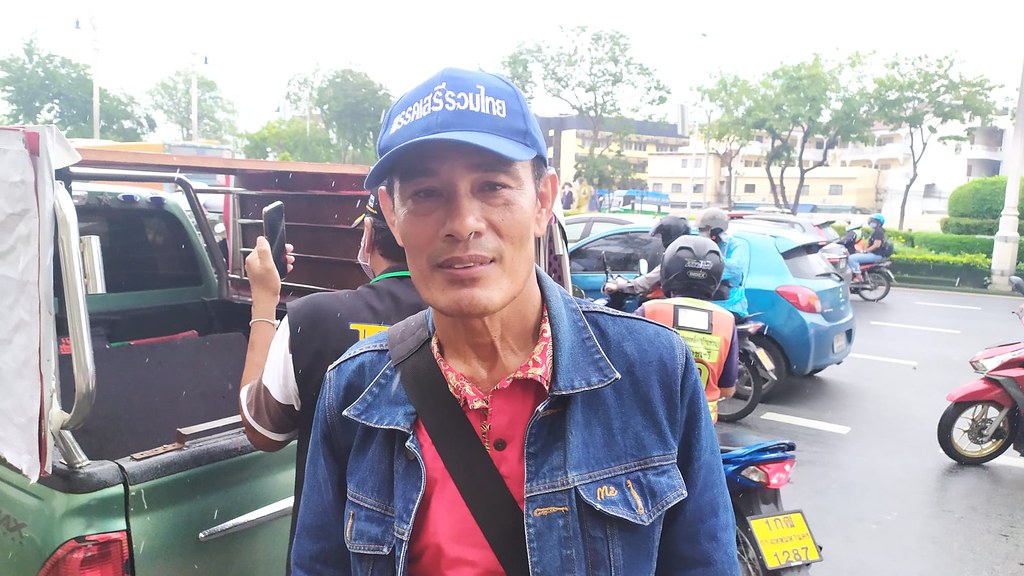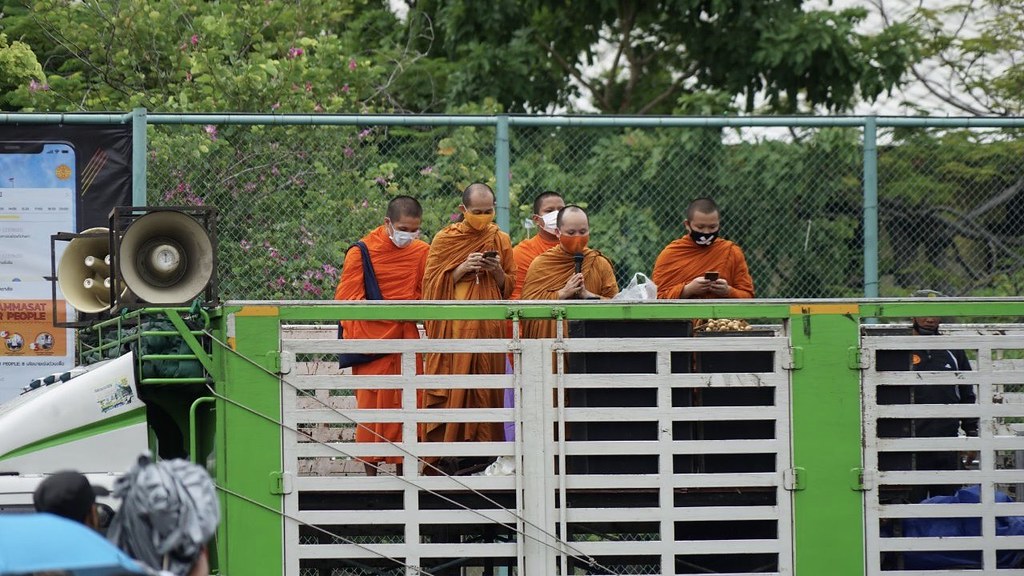
One of the biggest crowds gathered to join an overnight protest at the heart of Thammasat University and Sanam Luang to call for civil rights, constitutional amendments, and monarchy reform. Encapsulating hope and inspiration for a better Thailand, it was unprecedented in many ways. In the first episode of this report, here is a recap of the 19-20 September protest.
On 19 September, one of the biggest crowds in Thai contemporary history gathered at Thammasat University’s Tha Phra Chan Campus. They were numerous enough to block the authorities from coming in when they cut the chains at the gate of the campus. Led by student activist Panupong Jadnok, the protesters flooded into the campus in the middle of a light rain which had continued to fall since the morning.

Police did try to undermine the momentum before the protest. They seized 50,000 books, closed 2 universities, arrested 4 students, and stopped protesters’ vehicles at checkpoints. Unfortunately too many people joined. When the protesters successfully got into the campus, the police retreated and let public health officers come to the gate to check the body temperature of protesters before allowing them in.
The protest was highly anticipated because 19 September was the anniversary of the military coup in 2006. The United Front of Thammasat and Demonstration had earlier held a controversial protest on 10 August at Thammasat’s Rangsit Campus. Calling for monarchy reform, they read a 10-point proposal and displayed parody memes of political exiles along with adapted texts, fonts, colours, and frames normally used for the monarchy.

The protester leaders were facing charges of violating the sedition law, but continued to fight without faltering. A large crowd of protesters came as expected. After they successfully occupied Thammasat, other protesters started to spread into Sanam Luang in the rainy afternoon.
Protesters were from all walks of life. One of the protesters who came from Chiang Mai said that he once joined a campaign for motorcycle taxis to be able to get the yellow taxi license plates, and said that he was joining the protest to demand an "edible democracy."
Red shirt protesters came from numerous provinces. LGBT groups came to call for gender equality at the protest. Unaffiliated citizens, foreigners, and even monks joined the call for human rights and military and monarchy reform in a great variety of costumes. Some of them were first-time protesters. We were privileged to be given an opportunity to talk with several of them.
First-time protesters

Ratchanon Amphaphan, 46, works in a department store and came from Nakhon Pathom to join the protest. He said this was his first time at a political demonstration.
Ratchanon said that he was affected by the economic problems resulting from the Covid-19 pandemic, since his department store had to close. Even after the store re-opened, sales did not improve. He hasn't been receiving commissions, only his monthly salary, and said that he has two children to care for.
"I come to the protest because he wanted democracy back. Gen Prayut Chan-o-cha has been prime minister for too long but hasn't made the country better," said Ratchanon. "I want a new prime minister who can make the country better, who knows how to run the country, doesn't give out money for no purpose, and who will create jobs for the people."
Red for justice

Before the protesters broke the chains and entered the campus, a group of red-shirt protesters arrived at Thammasat University's Sanam Luang gate, carrying a flag and a picture of Maj Gen Khattiya Sawasdipol, or Se Daeng, a red-shirt leader who was shot and killed during the 2010 crackdown on the red-shirt protests.
They were seen waiting to enter TU and Sanam Luang. Some of them set up a food corner to provide protesters free food and drinks, while some took part in forcing a way into TU and Sanam Luang, assisting the young generation who have spearheaded this recent pro-democracy movement.
Meanwhile, at the foot of Phra Pin Klao bridge, around 300 metres away from Sanam Luang, stood the stage of the red shirts from Pathum Thani. One speaker said she came to support and protect the young generation.

Phansak Phetphithakchon was one of the red shirt leaders. The 58-year-old is the head of the 7 Western Provinces Red Shirts. He asked his people to join because the student demands for constitutional amendments, an end to harassing people and dissolution of parliament matched their demands.
“We are glad that the young generation are concerned about the nation and do not accept injustice such as the dissolution of political parties,” said Pansak.
The experiences of the red shirts and the student protesters are not much different. The political parties associated with ex-prime minister Thaksin Shinnawatra were dissolved by the Constitutional Court, including Thai Rak Thai (2007), People's Power Party (2008) and Thai Raksa Chart (2019), were dissolved by the Constitutional Court. When millions of the university students became first-time voters in 2019, the Future Forward Party, one of their favourite parties, was also dissolved by the same court.
When the red shirts called for political justice in 2010, more than 90 protesters were killed as they were labelled as local people manipulated by politicians. However, the students have learned about their past and honoured them as heroes.
In a recent protest at Chulalongkorn University, one student leader read out From Soil to the Sky, a famous speech by Nattawut Saikua, a red shirt leader who now languishes in jail, to honour their struggle for justice.
“We rallied before, but no one came out. But today, they accepted the red shirts as heroes. Today the red shirts have come out,” said Pansak.
The red shirts came not only from 7 western provinces, but also from 17 northern provinces. Some of them were stopped at police checkpoints including in Lamphun and Phayao provinces, but eventually they made it to the protest sites. They came to join the protest despite the fact that red shirt leader Jatuporn Prompan earlier asked the students not to touch the monarchy.
Saffron for change

Despite the possibility of being forced to leave the monkhood, six monks joined the protest on 19 September. When people gathered at the football field at heart of Thammasat University’s Tha Pra Chan campus, a truck was used as a stage from which the monks read a sutra from the Tripitaka about the appropriate roles of a monarch in a society according to Buddhist beliefs.
“If a King does not reside in virtue, citizens will suffer. If the King resides in virtue, citizens will be happy,” read a representative of the monks’ group.
They also prayed to express their compassion for the people who sacrificed their lives for democracy in modern Thai history and blessed the protesters with holy water to increase their morale in the days to come. The religious ceremony took around one hour.
Unlike in Myanmar where monks are politically active, Thailand has strict regulations against monks participating in politics. The Sangha Supreme Council of Thailand issued an order in 1995 that monks cannot express political opinions.
Even though an exception was made when the then Buddha Isara joined the protest of the People's Democratic Reform Committee which led to a military coup in 2014, most monks in Thailand remain silent in public when it comes to politics.
Just as with Thailand’s former constitutions, monks are not allowed to vote according to the 2017 Constitution. In 2017, Ecclesiastical Regional Governors) also released an order which prohibits monks from criticizing the pillar institutions of the country: including the nation, religions, and the monarchy.
To enforce this rule, abbots can order monks to leave monkhood for disobedience according to the 1962 Sangha Act. Since the protest, a report emerged that a monk who joined the protest has been forced to leave the monkhood, effective from the end of the period of Buddhist Lent on 2 October.
Rainbow for pride

Agele Anang, an influencer and the winner of Drag Race Thailand Season 2, represented the LGBT group on 19 September. This is her 4th time in an anti-government protest.
"This government is no longer legitimate. They have not provided equal justice to everyone, whether you are an LGBT person, or whether you are a woman. They are not transparent in every aspect, such as the budget. I am here to be a part to tell them what we want," says Angele Anang.
She said that LGBT group collaborates with Free Women because LGBT don't have a lead organizing group. Also, she said it's new for Thailand to have pride parade as we still don't have" pride". LGBT group needs rights, such as same-sex marriage.
The most important reason for her to join the protest was that there was no influencer coming out even though they have the same idea. She believes that influencers and actors were a group that can drive and impact society and show the people's stance and demands.
At the protest, the Free Women Movement, Free Toey Plus, the 1448 for All, and the Gender Rights Alliance unfolded a 15 m long rainbow flag, a symbol for gender equality, in Sanam Luang. They called for democracy that comes with the gender justice. The rights over one’s body, and of marginalized people like the LGBTQ, sex workers and the ethnic minorities were also addressed.
In the night to come, the LGBT groups would be the first in Thai history to address publicly the role of patriarchy in the Thai monarchy.
In July, LGBT activists began to play a major role in the democracy movement. By making fun of Prime Minister Prayut Chan-o-cha and his government, the activists want them to give everyone equal marriage rights by amending the Civil and Commercial Code instead of passing a separate Civil Partnership bill which will enable but still discriminate against LGBT marriages.
Occupying Thammasat was just the beginning of the protest.
Prachatai English is an independent, non-profit news outlet committed to covering underreported issues in Thailand, especially about democratization and human rights, despite pressure from the authorities. Your support will ensure that we stay a professional media source and be able to meet the challenges and deliver in-depth reporting.
• Simple steps to support Prachatai English
1. Bank transfer to account “โครงการหนังสือพิมพ์อินเทอร์เน็ต ประชาไท” or “Prachatai Online Newspaper” 091-0-21689-4, Krungthai Bank
2. Or, Transfer money via Paypal, to e-mail address: [email protected], please leave a comment on the transaction as “For Prachatai English”
